Ethical Considerations: NHS Gastric Bypass Surgery for Obese Patients
VerifiedAdded on 2022/08/25
|12
|4869
|16
Essay
AI Summary
This essay delves into the ethical considerations surrounding the NHS's provision of gastric bypass surgery to obese patients. It begins by arguing in favor of the NHS offering the surgery, highlighting its potential benefits in weight reduction and the mitigation of associated health risks. The essay explores the advantages and disadvantages of the surgery, considering the impact on patients' health and quality of life, as well as the financial implications for the NHS. The analysis identifies and constructs the ethical issues present, including the ethical dilemma of whether to offer the surgery, and contrasts this with other ethical issues like patient autonomy, resource allocation, and potential discrimination. Ethical theories, particularly deontology and utilitarianism, are employed to support the arguments, examining the intent and consequences of healthcare from various perspectives and exploring the importance of ethical frameworks in healthcare decision-making, including those related to clinical ethics, legal standards, and the ethical responsibilities of healthcare professionals. The essay also addresses issues of patient-doctor relationships, the potential for malpractice, and the need for effective information delivery within the NHS.
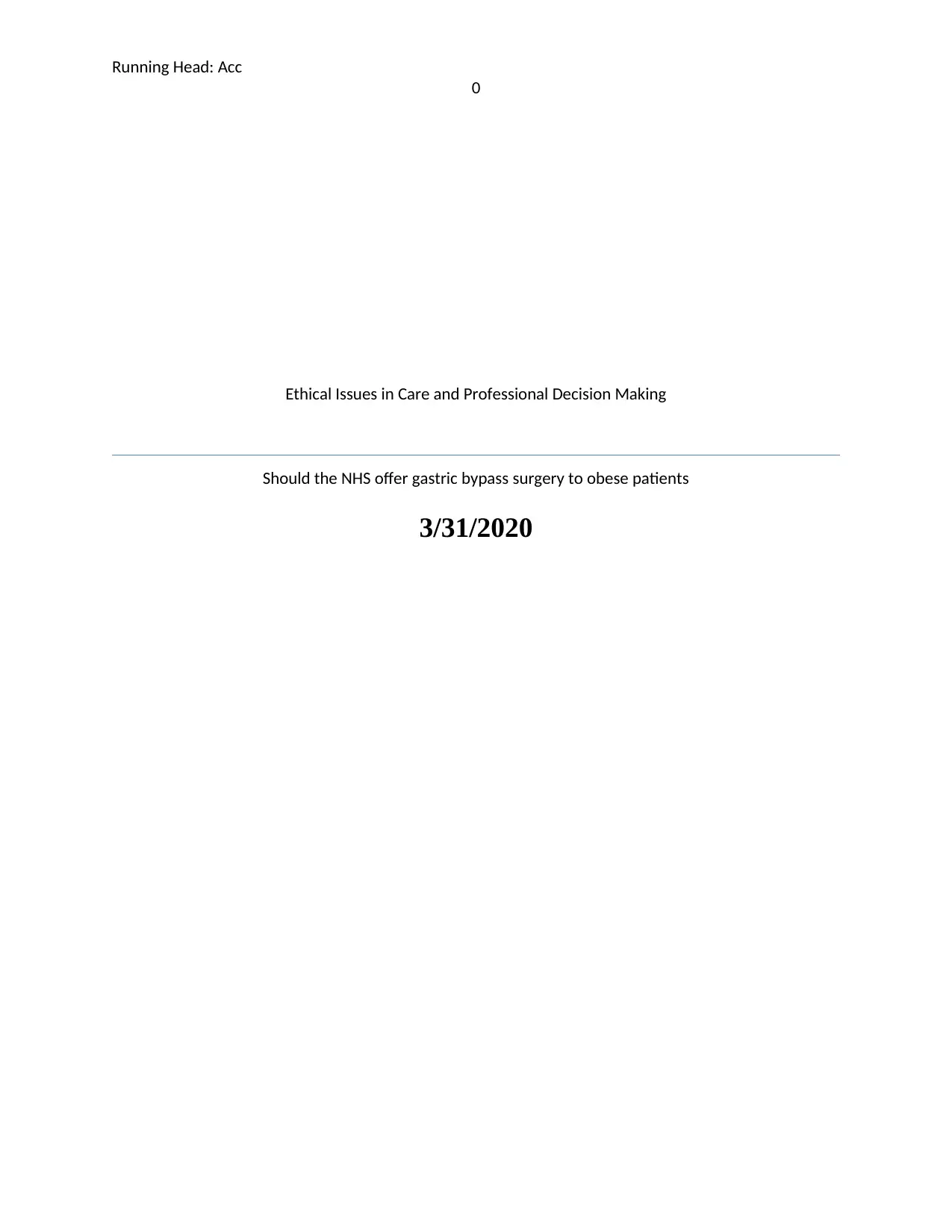
Running Head: Acc
0
Ethical Issues in Care and Professional Decision Making
Should the NHS offer gastric bypass surgery to obese patients
3/31/2020
0
Ethical Issues in Care and Professional Decision Making
Should the NHS offer gastric bypass surgery to obese patients
3/31/2020
Paraphrase This Document
Need a fresh take? Get an instant paraphrase of this document with our AI Paraphraser
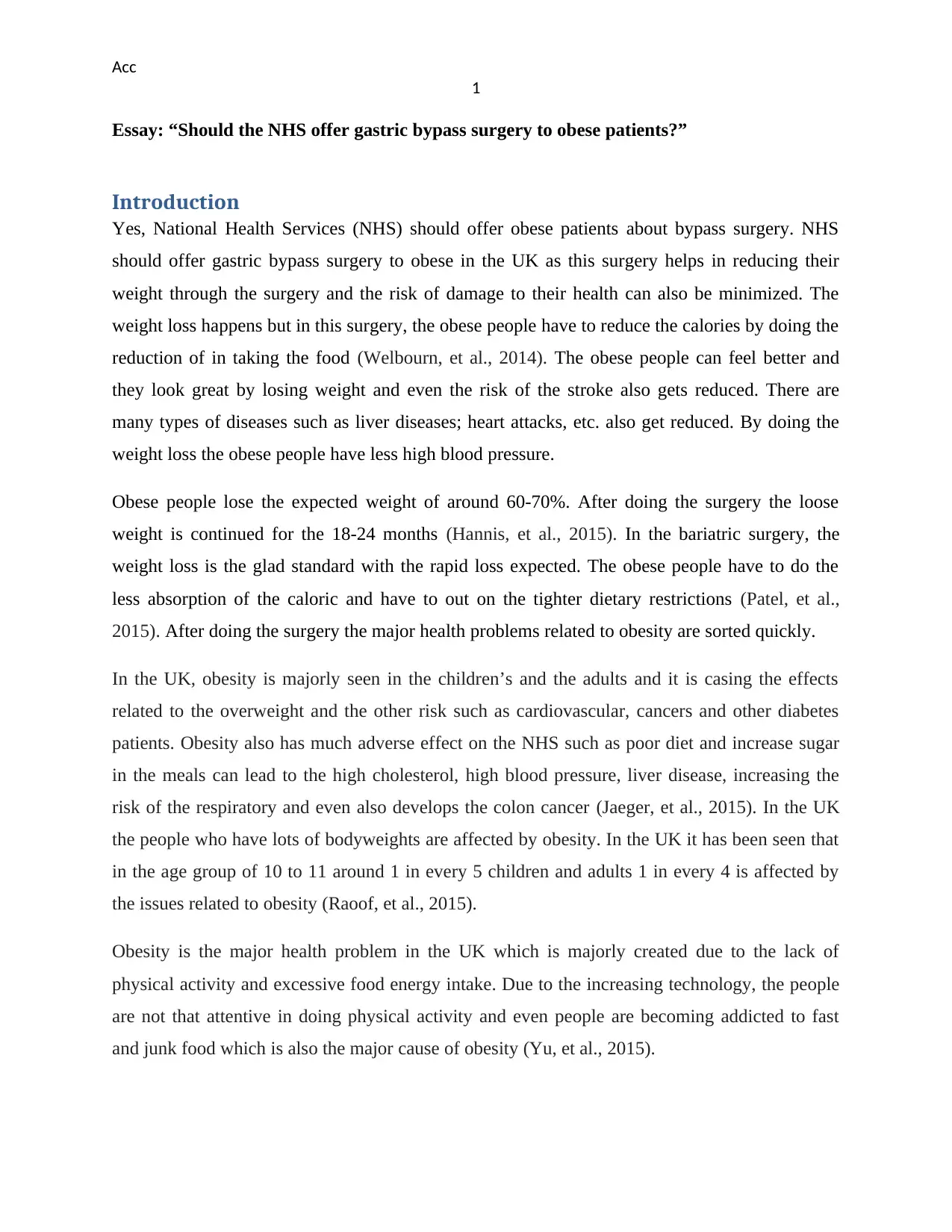
Acc
1
Essay: “Should the NHS offer gastric bypass surgery to obese patients?”
Introduction
Yes, National Health Services (NHS) should offer obese patients about bypass surgery. NHS
should offer gastric bypass surgery to obese in the UK as this surgery helps in reducing their
weight through the surgery and the risk of damage to their health can also be minimized. The
weight loss happens but in this surgery, the obese people have to reduce the calories by doing the
reduction of in taking the food (Welbourn, et al., 2014). The obese people can feel better and
they look great by losing weight and even the risk of the stroke also gets reduced. There are
many types of diseases such as liver diseases; heart attacks, etc. also get reduced. By doing the
weight loss the obese people have less high blood pressure.
Obese people lose the expected weight of around 60-70%. After doing the surgery the loose
weight is continued for the 18-24 months (Hannis, et al., 2015). In the bariatric surgery, the
weight loss is the glad standard with the rapid loss expected. The obese people have to do the
less absorption of the caloric and have to out on the tighter dietary restrictions (Patel, et al.,
2015). After doing the surgery the major health problems related to obesity are sorted quickly.
In the UK, obesity is majorly seen in the children’s and the adults and it is casing the effects
related to the overweight and the other risk such as cardiovascular, cancers and other diabetes
patients. Obesity also has much adverse effect on the NHS such as poor diet and increase sugar
in the meals can lead to the high cholesterol, high blood pressure, liver disease, increasing the
risk of the respiratory and even also develops the colon cancer (Jaeger, et al., 2015). In the UK
the people who have lots of bodyweights are affected by obesity. In the UK it has been seen that
in the age group of 10 to 11 around 1 in every 5 children and adults 1 in every 4 is affected by
the issues related to obesity (Raoof, et al., 2015).
Obesity is the major health problem in the UK which is majorly created due to the lack of
physical activity and excessive food energy intake. Due to the increasing technology, the people
are not that attentive in doing physical activity and even people are becoming addicted to fast
and junk food which is also the major cause of obesity (Yu, et al., 2015).
1
Essay: “Should the NHS offer gastric bypass surgery to obese patients?”
Introduction
Yes, National Health Services (NHS) should offer obese patients about bypass surgery. NHS
should offer gastric bypass surgery to obese in the UK as this surgery helps in reducing their
weight through the surgery and the risk of damage to their health can also be minimized. The
weight loss happens but in this surgery, the obese people have to reduce the calories by doing the
reduction of in taking the food (Welbourn, et al., 2014). The obese people can feel better and
they look great by losing weight and even the risk of the stroke also gets reduced. There are
many types of diseases such as liver diseases; heart attacks, etc. also get reduced. By doing the
weight loss the obese people have less high blood pressure.
Obese people lose the expected weight of around 60-70%. After doing the surgery the loose
weight is continued for the 18-24 months (Hannis, et al., 2015). In the bariatric surgery, the
weight loss is the glad standard with the rapid loss expected. The obese people have to do the
less absorption of the caloric and have to out on the tighter dietary restrictions (Patel, et al.,
2015). After doing the surgery the major health problems related to obesity are sorted quickly.
In the UK, obesity is majorly seen in the children’s and the adults and it is casing the effects
related to the overweight and the other risk such as cardiovascular, cancers and other diabetes
patients. Obesity also has much adverse effect on the NHS such as poor diet and increase sugar
in the meals can lead to the high cholesterol, high blood pressure, liver disease, increasing the
risk of the respiratory and even also develops the colon cancer (Jaeger, et al., 2015). In the UK
the people who have lots of bodyweights are affected by obesity. In the UK it has been seen that
in the age group of 10 to 11 around 1 in every 5 children and adults 1 in every 4 is affected by
the issues related to obesity (Raoof, et al., 2015).
Obesity is the major health problem in the UK which is majorly created due to the lack of
physical activity and excessive food energy intake. Due to the increasing technology, the people
are not that attentive in doing physical activity and even people are becoming addicted to fast
and junk food which is also the major cause of obesity (Yu, et al., 2015).
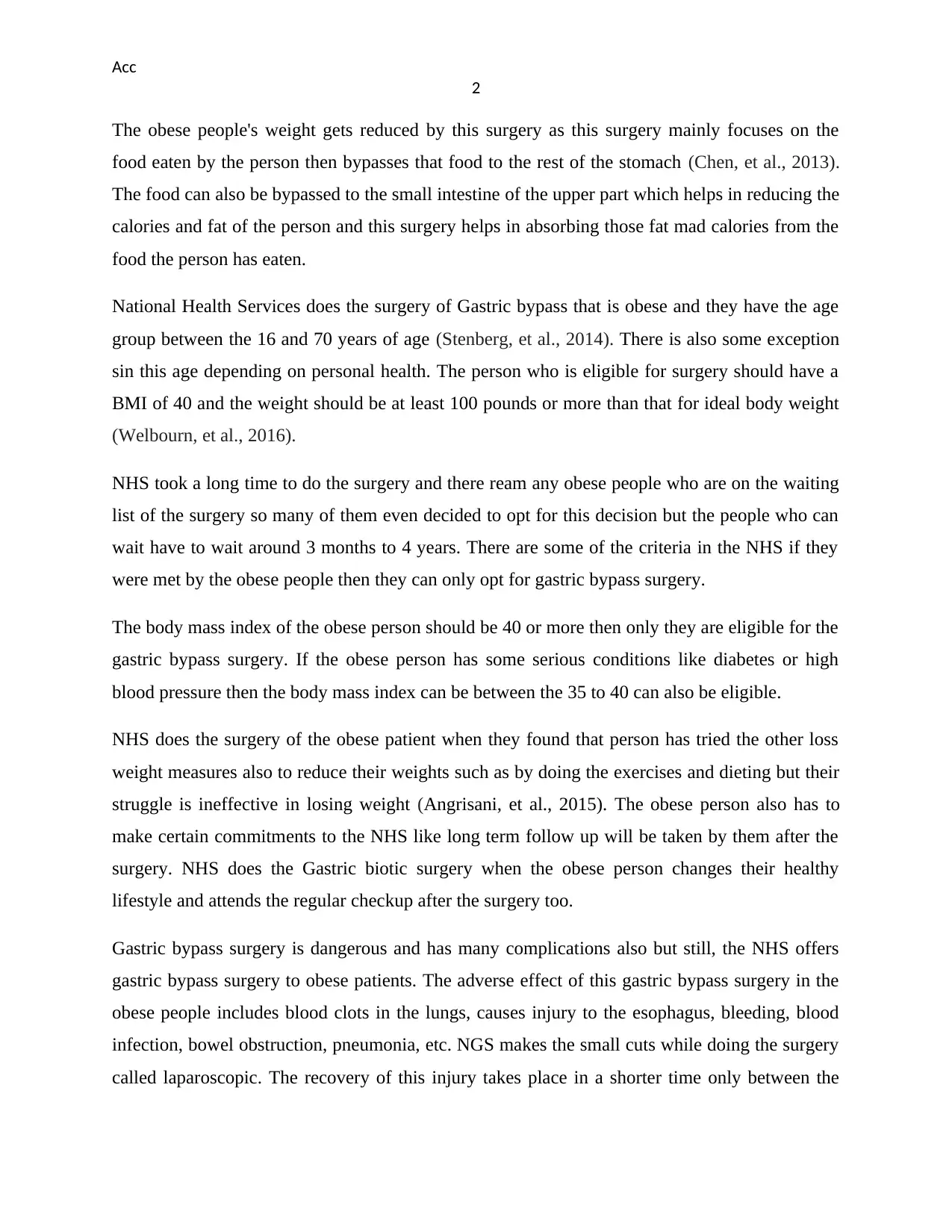
Acc
2
The obese people's weight gets reduced by this surgery as this surgery mainly focuses on the
food eaten by the person then bypasses that food to the rest of the stomach (Chen, et al., 2013).
The food can also be bypassed to the small intestine of the upper part which helps in reducing the
calories and fat of the person and this surgery helps in absorbing those fat mad calories from the
food the person has eaten.
National Health Services does the surgery of Gastric bypass that is obese and they have the age
group between the 16 and 70 years of age (Stenberg, et al., 2014). There is also some exception
sin this age depending on personal health. The person who is eligible for surgery should have a
BMI of 40 and the weight should be at least 100 pounds or more than that for ideal body weight
(Welbourn, et al., 2016).
NHS took a long time to do the surgery and there ream any obese people who are on the waiting
list of the surgery so many of them even decided to opt for this decision but the people who can
wait have to wait around 3 months to 4 years. There are some of the criteria in the NHS if they
were met by the obese people then they can only opt for gastric bypass surgery.
The body mass index of the obese person should be 40 or more then only they are eligible for the
gastric bypass surgery. If the obese person has some serious conditions like diabetes or high
blood pressure then the body mass index can be between the 35 to 40 can also be eligible.
NHS does the surgery of the obese patient when they found that person has tried the other loss
weight measures also to reduce their weights such as by doing the exercises and dieting but their
struggle is ineffective in losing weight (Angrisani, et al., 2015). The obese person also has to
make certain commitments to the NHS like long term follow up will be taken by them after the
surgery. NHS does the Gastric biotic surgery when the obese person changes their healthy
lifestyle and attends the regular checkup after the surgery too.
Gastric bypass surgery is dangerous and has many complications also but still, the NHS offers
gastric bypass surgery to obese patients. The adverse effect of this gastric bypass surgery in the
obese people includes blood clots in the lungs, causes injury to the esophagus, bleeding, blood
infection, bowel obstruction, pneumonia, etc. NGS makes the small cuts while doing the surgery
called laparoscopic. The recovery of this injury takes place in a shorter time only between the
2
The obese people's weight gets reduced by this surgery as this surgery mainly focuses on the
food eaten by the person then bypasses that food to the rest of the stomach (Chen, et al., 2013).
The food can also be bypassed to the small intestine of the upper part which helps in reducing the
calories and fat of the person and this surgery helps in absorbing those fat mad calories from the
food the person has eaten.
National Health Services does the surgery of Gastric bypass that is obese and they have the age
group between the 16 and 70 years of age (Stenberg, et al., 2014). There is also some exception
sin this age depending on personal health. The person who is eligible for surgery should have a
BMI of 40 and the weight should be at least 100 pounds or more than that for ideal body weight
(Welbourn, et al., 2016).
NHS took a long time to do the surgery and there ream any obese people who are on the waiting
list of the surgery so many of them even decided to opt for this decision but the people who can
wait have to wait around 3 months to 4 years. There are some of the criteria in the NHS if they
were met by the obese people then they can only opt for gastric bypass surgery.
The body mass index of the obese person should be 40 or more then only they are eligible for the
gastric bypass surgery. If the obese person has some serious conditions like diabetes or high
blood pressure then the body mass index can be between the 35 to 40 can also be eligible.
NHS does the surgery of the obese patient when they found that person has tried the other loss
weight measures also to reduce their weights such as by doing the exercises and dieting but their
struggle is ineffective in losing weight (Angrisani, et al., 2015). The obese person also has to
make certain commitments to the NHS like long term follow up will be taken by them after the
surgery. NHS does the Gastric biotic surgery when the obese person changes their healthy
lifestyle and attends the regular checkup after the surgery too.
Gastric bypass surgery is dangerous and has many complications also but still, the NHS offers
gastric bypass surgery to obese patients. The adverse effect of this gastric bypass surgery in the
obese people includes blood clots in the lungs, causes injury to the esophagus, bleeding, blood
infection, bowel obstruction, pneumonia, etc. NGS makes the small cuts while doing the surgery
called laparoscopic. The recovery of this injury takes place in a shorter time only between the
⊘ This is a preview!⊘
Do you want full access?
Subscribe today to unlock all pages.

Trusted by 1+ million students worldwide
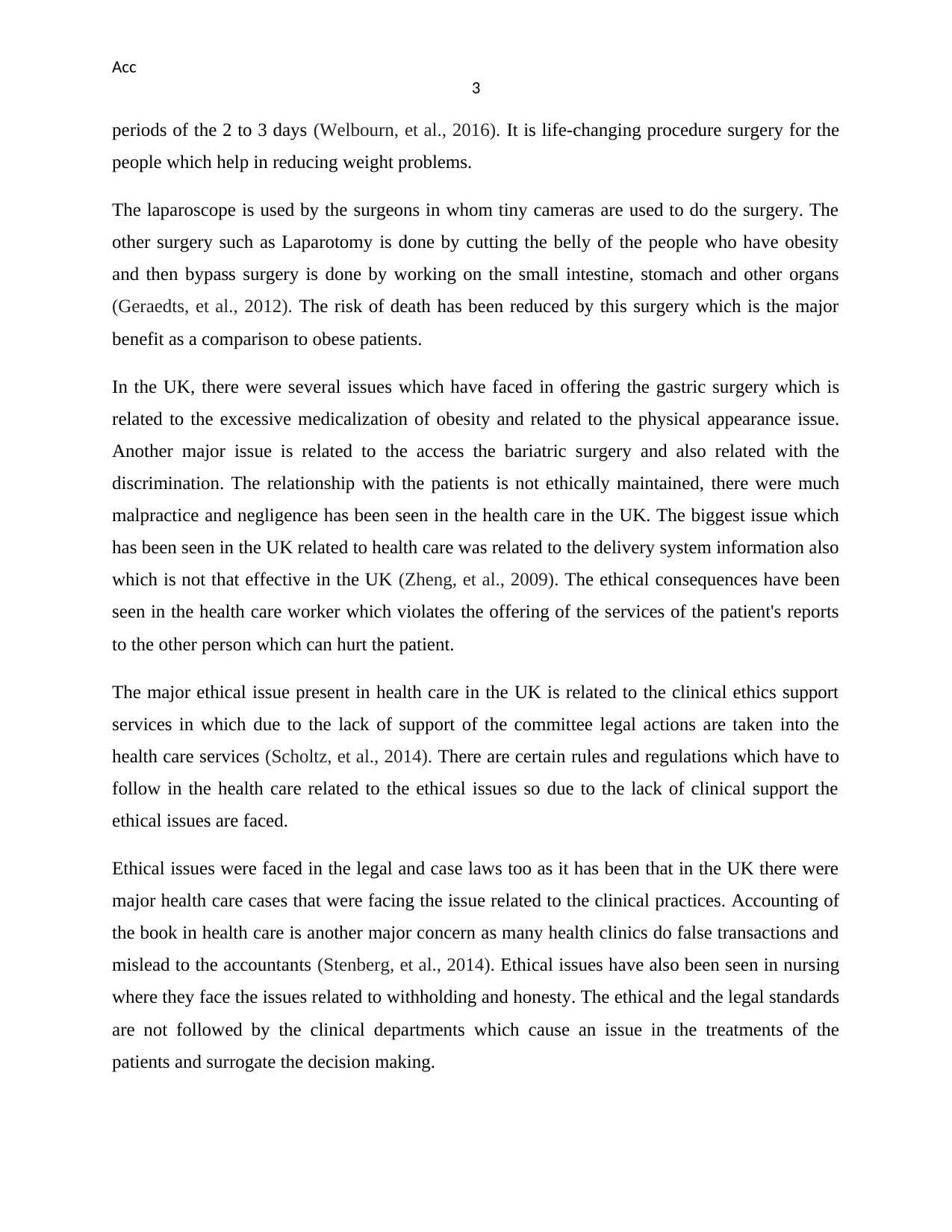
Acc
3
periods of the 2 to 3 days (Welbourn, et al., 2016). It is life-changing procedure surgery for the
people which help in reducing weight problems.
The laparoscope is used by the surgeons in whom tiny cameras are used to do the surgery. The
other surgery such as Laparotomy is done by cutting the belly of the people who have obesity
and then bypass surgery is done by working on the small intestine, stomach and other organs
(Geraedts, et al., 2012). The risk of death has been reduced by this surgery which is the major
benefit as a comparison to obese patients.
In the UK, there were several issues which have faced in offering the gastric surgery which is
related to the excessive medicalization of obesity and related to the physical appearance issue.
Another major issue is related to the access the bariatric surgery and also related with the
discrimination. The relationship with the patients is not ethically maintained, there were much
malpractice and negligence has been seen in the health care in the UK. The biggest issue which
has been seen in the UK related to health care was related to the delivery system information also
which is not that effective in the UK (Zheng, et al., 2009). The ethical consequences have been
seen in the health care worker which violates the offering of the services of the patient's reports
to the other person which can hurt the patient.
The major ethical issue present in health care in the UK is related to the clinical ethics support
services in which due to the lack of support of the committee legal actions are taken into the
health care services (Scholtz, et al., 2014). There are certain rules and regulations which have to
follow in the health care related to the ethical issues so due to the lack of clinical support the
ethical issues are faced.
Ethical issues were faced in the legal and case laws too as it has been that in the UK there were
major health care cases that were facing the issue related to the clinical practices. Accounting of
the book in health care is another major concern as many health clinics do false transactions and
mislead to the accountants (Stenberg, et al., 2014). Ethical issues have also been seen in nursing
where they face the issues related to withholding and honesty. The ethical and the legal standards
are not followed by the clinical departments which cause an issue in the treatments of the
patients and surrogate the decision making.
3
periods of the 2 to 3 days (Welbourn, et al., 2016). It is life-changing procedure surgery for the
people which help in reducing weight problems.
The laparoscope is used by the surgeons in whom tiny cameras are used to do the surgery. The
other surgery such as Laparotomy is done by cutting the belly of the people who have obesity
and then bypass surgery is done by working on the small intestine, stomach and other organs
(Geraedts, et al., 2012). The risk of death has been reduced by this surgery which is the major
benefit as a comparison to obese patients.
In the UK, there were several issues which have faced in offering the gastric surgery which is
related to the excessive medicalization of obesity and related to the physical appearance issue.
Another major issue is related to the access the bariatric surgery and also related with the
discrimination. The relationship with the patients is not ethically maintained, there were much
malpractice and negligence has been seen in the health care in the UK. The biggest issue which
has been seen in the UK related to health care was related to the delivery system information also
which is not that effective in the UK (Zheng, et al., 2009). The ethical consequences have been
seen in the health care worker which violates the offering of the services of the patient's reports
to the other person which can hurt the patient.
The major ethical issue present in health care in the UK is related to the clinical ethics support
services in which due to the lack of support of the committee legal actions are taken into the
health care services (Scholtz, et al., 2014). There are certain rules and regulations which have to
follow in the health care related to the ethical issues so due to the lack of clinical support the
ethical issues are faced.
Ethical issues were faced in the legal and case laws too as it has been that in the UK there were
major health care cases that were facing the issue related to the clinical practices. Accounting of
the book in health care is another major concern as many health clinics do false transactions and
mislead to the accountants (Stenberg, et al., 2014). Ethical issues have also been seen in nursing
where they face the issues related to withholding and honesty. The ethical and the legal standards
are not followed by the clinical departments which cause an issue in the treatments of the
patients and surrogate the decision making.
Paraphrase This Document
Need a fresh take? Get an instant paraphrase of this document with our AI Paraphraser
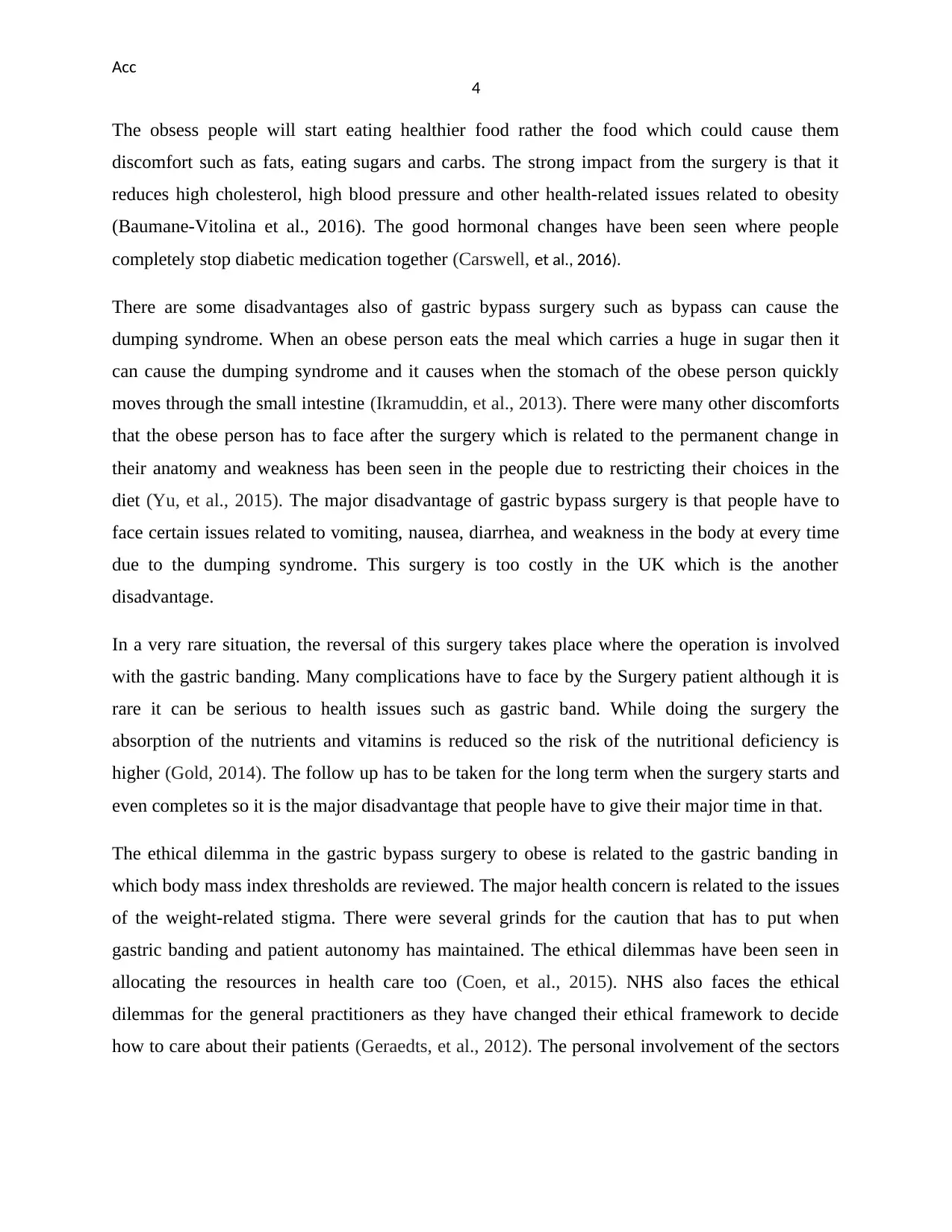
Acc
4
The obsess people will start eating healthier food rather the food which could cause them
discomfort such as fats, eating sugars and carbs. The strong impact from the surgery is that it
reduces high cholesterol, high blood pressure and other health-related issues related to obesity
(Baumane-Vitolina et al., 2016). The good hormonal changes have been seen where people
completely stop diabetic medication together (Carswell, et al., 2016).
There are some disadvantages also of gastric bypass surgery such as bypass can cause the
dumping syndrome. When an obese person eats the meal which carries a huge in sugar then it
can cause the dumping syndrome and it causes when the stomach of the obese person quickly
moves through the small intestine (Ikramuddin, et al., 2013). There were many other discomforts
that the obese person has to face after the surgery which is related to the permanent change in
their anatomy and weakness has been seen in the people due to restricting their choices in the
diet (Yu, et al., 2015). The major disadvantage of gastric bypass surgery is that people have to
face certain issues related to vomiting, nausea, diarrhea, and weakness in the body at every time
due to the dumping syndrome. This surgery is too costly in the UK which is the another
disadvantage.
In a very rare situation, the reversal of this surgery takes place where the operation is involved
with the gastric banding. Many complications have to face by the Surgery patient although it is
rare it can be serious to health issues such as gastric band. While doing the surgery the
absorption of the nutrients and vitamins is reduced so the risk of the nutritional deficiency is
higher (Gold, 2014). The follow up has to be taken for the long term when the surgery starts and
even completes so it is the major disadvantage that people have to give their major time in that.
The ethical dilemma in the gastric bypass surgery to obese is related to the gastric banding in
which body mass index thresholds are reviewed. The major health concern is related to the issues
of the weight-related stigma. There were several grinds for the caution that has to put when
gastric banding and patient autonomy has maintained. The ethical dilemmas have been seen in
allocating the resources in health care too (Coen, et al., 2015). NHS also faces the ethical
dilemmas for the general practitioners as they have changed their ethical framework to decide
how to care about their patients (Geraedts, et al., 2012). The personal involvement of the sectors
4
The obsess people will start eating healthier food rather the food which could cause them
discomfort such as fats, eating sugars and carbs. The strong impact from the surgery is that it
reduces high cholesterol, high blood pressure and other health-related issues related to obesity
(Baumane-Vitolina et al., 2016). The good hormonal changes have been seen where people
completely stop diabetic medication together (Carswell, et al., 2016).
There are some disadvantages also of gastric bypass surgery such as bypass can cause the
dumping syndrome. When an obese person eats the meal which carries a huge in sugar then it
can cause the dumping syndrome and it causes when the stomach of the obese person quickly
moves through the small intestine (Ikramuddin, et al., 2013). There were many other discomforts
that the obese person has to face after the surgery which is related to the permanent change in
their anatomy and weakness has been seen in the people due to restricting their choices in the
diet (Yu, et al., 2015). The major disadvantage of gastric bypass surgery is that people have to
face certain issues related to vomiting, nausea, diarrhea, and weakness in the body at every time
due to the dumping syndrome. This surgery is too costly in the UK which is the another
disadvantage.
In a very rare situation, the reversal of this surgery takes place where the operation is involved
with the gastric banding. Many complications have to face by the Surgery patient although it is
rare it can be serious to health issues such as gastric band. While doing the surgery the
absorption of the nutrients and vitamins is reduced so the risk of the nutritional deficiency is
higher (Gold, 2014). The follow up has to be taken for the long term when the surgery starts and
even completes so it is the major disadvantage that people have to give their major time in that.
The ethical dilemma in the gastric bypass surgery to obese is related to the gastric banding in
which body mass index thresholds are reviewed. The major health concern is related to the issues
of the weight-related stigma. There were several grinds for the caution that has to put when
gastric banding and patient autonomy has maintained. The ethical dilemmas have been seen in
allocating the resources in health care too (Coen, et al., 2015). NHS also faces the ethical
dilemmas for the general practitioners as they have changed their ethical framework to decide
how to care about their patients (Geraedts, et al., 2012). The personal involvement of the sectors
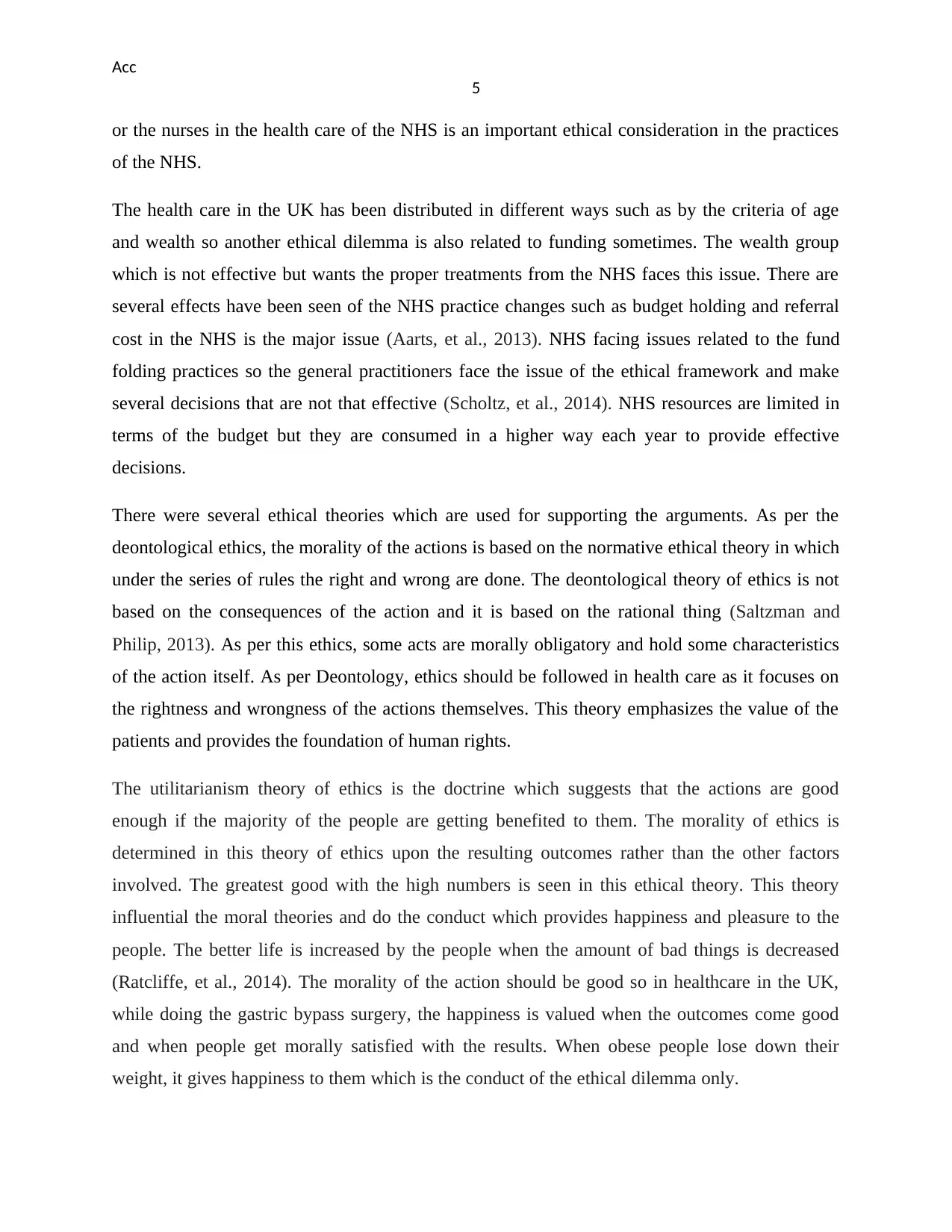
Acc
5
or the nurses in the health care of the NHS is an important ethical consideration in the practices
of the NHS.
The health care in the UK has been distributed in different ways such as by the criteria of age
and wealth so another ethical dilemma is also related to funding sometimes. The wealth group
which is not effective but wants the proper treatments from the NHS faces this issue. There are
several effects have been seen of the NHS practice changes such as budget holding and referral
cost in the NHS is the major issue (Aarts, et al., 2013). NHS facing issues related to the fund
folding practices so the general practitioners face the issue of the ethical framework and make
several decisions that are not that effective (Scholtz, et al., 2014). NHS resources are limited in
terms of the budget but they are consumed in a higher way each year to provide effective
decisions.
There were several ethical theories which are used for supporting the arguments. As per the
deontological ethics, the morality of the actions is based on the normative ethical theory in which
under the series of rules the right and wrong are done. The deontological theory of ethics is not
based on the consequences of the action and it is based on the rational thing (Saltzman and
Philip, 2013). As per this ethics, some acts are morally obligatory and hold some characteristics
of the action itself. As per Deontology, ethics should be followed in health care as it focuses on
the rightness and wrongness of the actions themselves. This theory emphasizes the value of the
patients and provides the foundation of human rights.
The utilitarianism theory of ethics is the doctrine which suggests that the actions are good
enough if the majority of the people are getting benefited to them. The morality of ethics is
determined in this theory of ethics upon the resulting outcomes rather than the other factors
involved. The greatest good with the high numbers is seen in this ethical theory. This theory
influential the moral theories and do the conduct which provides happiness and pleasure to the
people. The better life is increased by the people when the amount of bad things is decreased
(Ratcliffe, et al., 2014). The morality of the action should be good so in healthcare in the UK,
while doing the gastric bypass surgery, the happiness is valued when the outcomes come good
and when people get morally satisfied with the results. When obese people lose down their
weight, it gives happiness to them which is the conduct of the ethical dilemma only.
5
or the nurses in the health care of the NHS is an important ethical consideration in the practices
of the NHS.
The health care in the UK has been distributed in different ways such as by the criteria of age
and wealth so another ethical dilemma is also related to funding sometimes. The wealth group
which is not effective but wants the proper treatments from the NHS faces this issue. There are
several effects have been seen of the NHS practice changes such as budget holding and referral
cost in the NHS is the major issue (Aarts, et al., 2013). NHS facing issues related to the fund
folding practices so the general practitioners face the issue of the ethical framework and make
several decisions that are not that effective (Scholtz, et al., 2014). NHS resources are limited in
terms of the budget but they are consumed in a higher way each year to provide effective
decisions.
There were several ethical theories which are used for supporting the arguments. As per the
deontological ethics, the morality of the actions is based on the normative ethical theory in which
under the series of rules the right and wrong are done. The deontological theory of ethics is not
based on the consequences of the action and it is based on the rational thing (Saltzman and
Philip, 2013). As per this ethics, some acts are morally obligatory and hold some characteristics
of the action itself. As per Deontology, ethics should be followed in health care as it focuses on
the rightness and wrongness of the actions themselves. This theory emphasizes the value of the
patients and provides the foundation of human rights.
The utilitarianism theory of ethics is the doctrine which suggests that the actions are good
enough if the majority of the people are getting benefited to them. The morality of ethics is
determined in this theory of ethics upon the resulting outcomes rather than the other factors
involved. The greatest good with the high numbers is seen in this ethical theory. This theory
influential the moral theories and do the conduct which provides happiness and pleasure to the
people. The better life is increased by the people when the amount of bad things is decreased
(Ratcliffe, et al., 2014). The morality of the action should be good so in healthcare in the UK,
while doing the gastric bypass surgery, the happiness is valued when the outcomes come good
and when people get morally satisfied with the results. When obese people lose down their
weight, it gives happiness to them which is the conduct of the ethical dilemma only.
⊘ This is a preview!⊘
Do you want full access?
Subscribe today to unlock all pages.

Trusted by 1+ million students worldwide
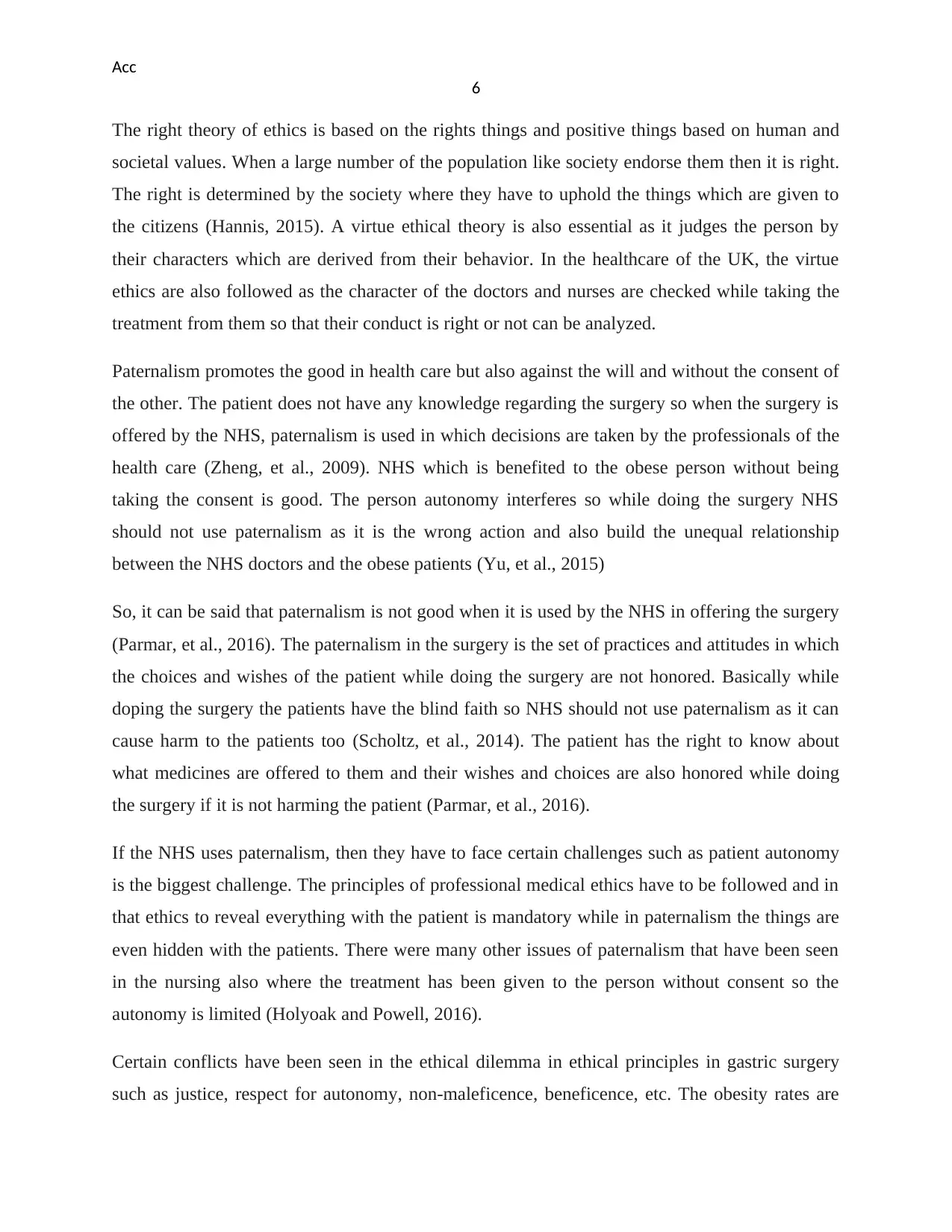
Acc
6
The right theory of ethics is based on the rights things and positive things based on human and
societal values. When a large number of the population like society endorse them then it is right.
The right is determined by the society where they have to uphold the things which are given to
the citizens (Hannis, 2015). A virtue ethical theory is also essential as it judges the person by
their characters which are derived from their behavior. In the healthcare of the UK, the virtue
ethics are also followed as the character of the doctors and nurses are checked while taking the
treatment from them so that their conduct is right or not can be analyzed.
Paternalism promotes the good in health care but also against the will and without the consent of
the other. The patient does not have any knowledge regarding the surgery so when the surgery is
offered by the NHS, paternalism is used in which decisions are taken by the professionals of the
health care (Zheng, et al., 2009). NHS which is benefited to the obese person without being
taking the consent is good. The person autonomy interferes so while doing the surgery NHS
should not use paternalism as it is the wrong action and also build the unequal relationship
between the NHS doctors and the obese patients (Yu, et al., 2015)
So, it can be said that paternalism is not good when it is used by the NHS in offering the surgery
(Parmar, et al., 2016). The paternalism in the surgery is the set of practices and attitudes in which
the choices and wishes of the patient while doing the surgery are not honored. Basically while
doping the surgery the patients have the blind faith so NHS should not use paternalism as it can
cause harm to the patients too (Scholtz, et al., 2014). The patient has the right to know about
what medicines are offered to them and their wishes and choices are also honored while doing
the surgery if it is not harming the patient (Parmar, et al., 2016).
If the NHS uses paternalism, then they have to face certain challenges such as patient autonomy
is the biggest challenge. The principles of professional medical ethics have to be followed and in
that ethics to reveal everything with the patient is mandatory while in paternalism the things are
even hidden with the patients. There were many other issues of paternalism that have been seen
in the nursing also where the treatment has been given to the person without consent so the
autonomy is limited (Holyoak and Powell, 2016).
Certain conflicts have been seen in the ethical dilemma in ethical principles in gastric surgery
such as justice, respect for autonomy, non-maleficence, beneficence, etc. The obesity rates are
6
The right theory of ethics is based on the rights things and positive things based on human and
societal values. When a large number of the population like society endorse them then it is right.
The right is determined by the society where they have to uphold the things which are given to
the citizens (Hannis, 2015). A virtue ethical theory is also essential as it judges the person by
their characters which are derived from their behavior. In the healthcare of the UK, the virtue
ethics are also followed as the character of the doctors and nurses are checked while taking the
treatment from them so that their conduct is right or not can be analyzed.
Paternalism promotes the good in health care but also against the will and without the consent of
the other. The patient does not have any knowledge regarding the surgery so when the surgery is
offered by the NHS, paternalism is used in which decisions are taken by the professionals of the
health care (Zheng, et al., 2009). NHS which is benefited to the obese person without being
taking the consent is good. The person autonomy interferes so while doing the surgery NHS
should not use paternalism as it is the wrong action and also build the unequal relationship
between the NHS doctors and the obese patients (Yu, et al., 2015)
So, it can be said that paternalism is not good when it is used by the NHS in offering the surgery
(Parmar, et al., 2016). The paternalism in the surgery is the set of practices and attitudes in which
the choices and wishes of the patient while doing the surgery are not honored. Basically while
doping the surgery the patients have the blind faith so NHS should not use paternalism as it can
cause harm to the patients too (Scholtz, et al., 2014). The patient has the right to know about
what medicines are offered to them and their wishes and choices are also honored while doing
the surgery if it is not harming the patient (Parmar, et al., 2016).
If the NHS uses paternalism, then they have to face certain challenges such as patient autonomy
is the biggest challenge. The principles of professional medical ethics have to be followed and in
that ethics to reveal everything with the patient is mandatory while in paternalism the things are
even hidden with the patients. There were many other issues of paternalism that have been seen
in the nursing also where the treatment has been given to the person without consent so the
autonomy is limited (Holyoak and Powell, 2016).
Certain conflicts have been seen in the ethical dilemma in ethical principles in gastric surgery
such as justice, respect for autonomy, non-maleficence, beneficence, etc. The obesity rates are
Paraphrase This Document
Need a fresh take? Get an instant paraphrase of this document with our AI Paraphraser
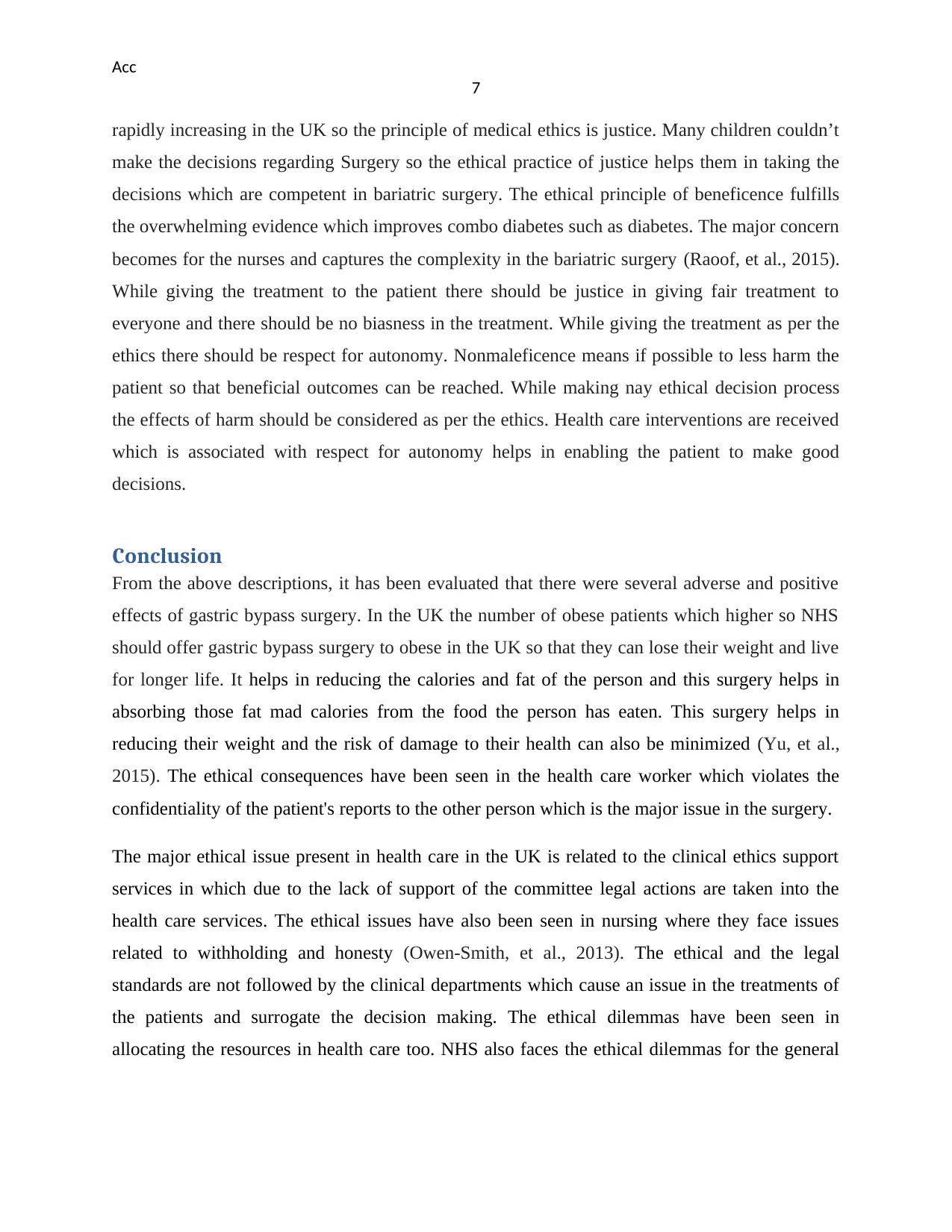
Acc
7
rapidly increasing in the UK so the principle of medical ethics is justice. Many children couldn’t
make the decisions regarding Surgery so the ethical practice of justice helps them in taking the
decisions which are competent in bariatric surgery. The ethical principle of beneficence fulfills
the overwhelming evidence which improves combo diabetes such as diabetes. The major concern
becomes for the nurses and captures the complexity in the bariatric surgery (Raoof, et al., 2015).
While giving the treatment to the patient there should be justice in giving fair treatment to
everyone and there should be no biasness in the treatment. While giving the treatment as per the
ethics there should be respect for autonomy. Nonmaleficence means if possible to less harm the
patient so that beneficial outcomes can be reached. While making nay ethical decision process
the effects of harm should be considered as per the ethics. Health care interventions are received
which is associated with respect for autonomy helps in enabling the patient to make good
decisions.
Conclusion
From the above descriptions, it has been evaluated that there were several adverse and positive
effects of gastric bypass surgery. In the UK the number of obese patients which higher so NHS
should offer gastric bypass surgery to obese in the UK so that they can lose their weight and live
for longer life. It helps in reducing the calories and fat of the person and this surgery helps in
absorbing those fat mad calories from the food the person has eaten. This surgery helps in
reducing their weight and the risk of damage to their health can also be minimized (Yu, et al.,
2015). The ethical consequences have been seen in the health care worker which violates the
confidentiality of the patient's reports to the other person which is the major issue in the surgery.
The major ethical issue present in health care in the UK is related to the clinical ethics support
services in which due to the lack of support of the committee legal actions are taken into the
health care services. The ethical issues have also been seen in nursing where they face issues
related to withholding and honesty (Owen-Smith, et al., 2013). The ethical and the legal
standards are not followed by the clinical departments which cause an issue in the treatments of
the patients and surrogate the decision making. The ethical dilemmas have been seen in
allocating the resources in health care too. NHS also faces the ethical dilemmas for the general
7
rapidly increasing in the UK so the principle of medical ethics is justice. Many children couldn’t
make the decisions regarding Surgery so the ethical practice of justice helps them in taking the
decisions which are competent in bariatric surgery. The ethical principle of beneficence fulfills
the overwhelming evidence which improves combo diabetes such as diabetes. The major concern
becomes for the nurses and captures the complexity in the bariatric surgery (Raoof, et al., 2015).
While giving the treatment to the patient there should be justice in giving fair treatment to
everyone and there should be no biasness in the treatment. While giving the treatment as per the
ethics there should be respect for autonomy. Nonmaleficence means if possible to less harm the
patient so that beneficial outcomes can be reached. While making nay ethical decision process
the effects of harm should be considered as per the ethics. Health care interventions are received
which is associated with respect for autonomy helps in enabling the patient to make good
decisions.
Conclusion
From the above descriptions, it has been evaluated that there were several adverse and positive
effects of gastric bypass surgery. In the UK the number of obese patients which higher so NHS
should offer gastric bypass surgery to obese in the UK so that they can lose their weight and live
for longer life. It helps in reducing the calories and fat of the person and this surgery helps in
absorbing those fat mad calories from the food the person has eaten. This surgery helps in
reducing their weight and the risk of damage to their health can also be minimized (Yu, et al.,
2015). The ethical consequences have been seen in the health care worker which violates the
confidentiality of the patient's reports to the other person which is the major issue in the surgery.
The major ethical issue present in health care in the UK is related to the clinical ethics support
services in which due to the lack of support of the committee legal actions are taken into the
health care services. The ethical issues have also been seen in nursing where they face issues
related to withholding and honesty (Owen-Smith, et al., 2013). The ethical and the legal
standards are not followed by the clinical departments which cause an issue in the treatments of
the patients and surrogate the decision making. The ethical dilemmas have been seen in
allocating the resources in health care too. NHS also faces the ethical dilemmas for the general
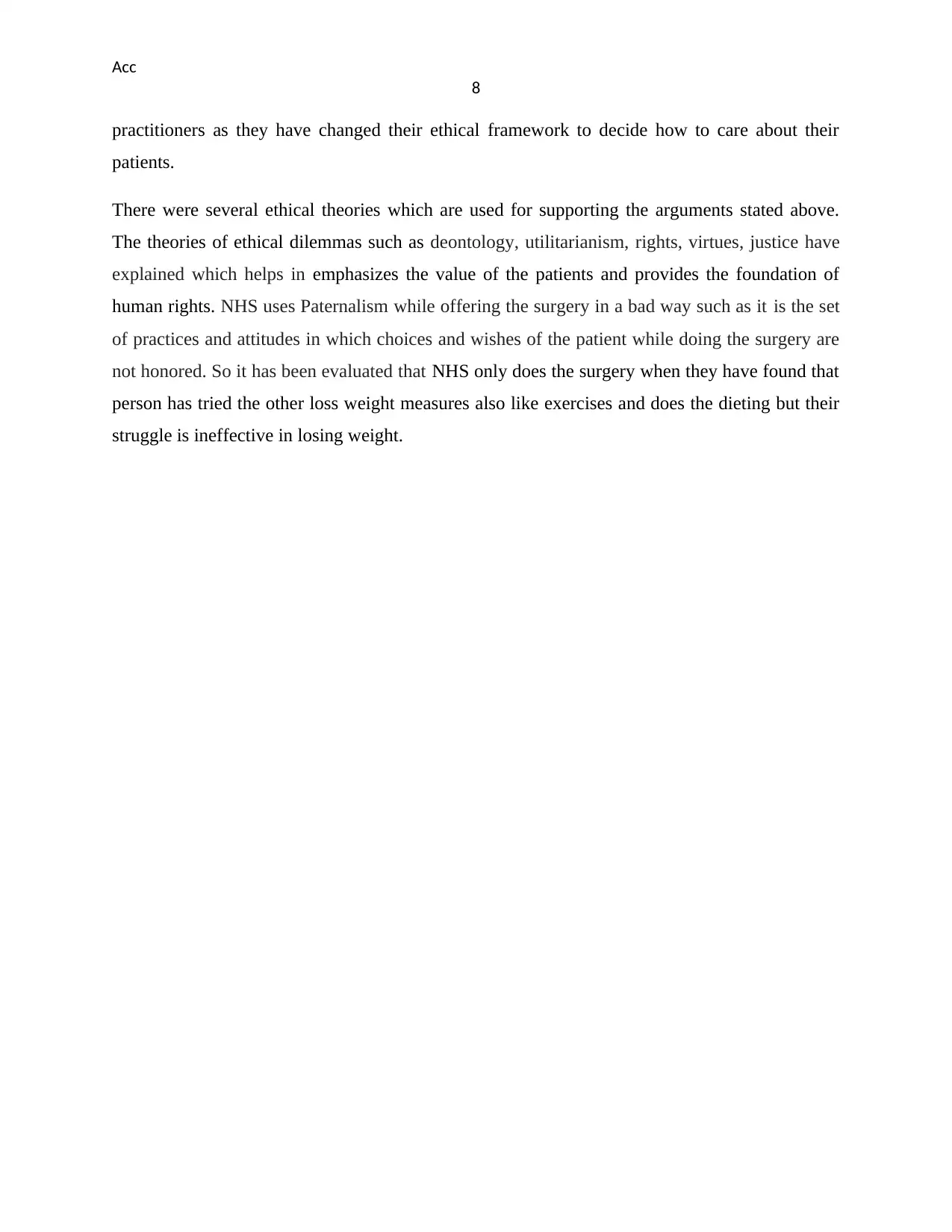
Acc
8
practitioners as they have changed their ethical framework to decide how to care about their
patients.
There were several ethical theories which are used for supporting the arguments stated above.
The theories of ethical dilemmas such as deontology, utilitarianism, rights, virtues, justice have
explained which helps in emphasizes the value of the patients and provides the foundation of
human rights. NHS uses Paternalism while offering the surgery in a bad way such as it is the set
of practices and attitudes in which choices and wishes of the patient while doing the surgery are
not honored. So it has been evaluated that NHS only does the surgery when they have found that
person has tried the other loss weight measures also like exercises and does the dieting but their
struggle is ineffective in losing weight.
8
practitioners as they have changed their ethical framework to decide how to care about their
patients.
There were several ethical theories which are used for supporting the arguments stated above.
The theories of ethical dilemmas such as deontology, utilitarianism, rights, virtues, justice have
explained which helps in emphasizes the value of the patients and provides the foundation of
human rights. NHS uses Paternalism while offering the surgery in a bad way such as it is the set
of practices and attitudes in which choices and wishes of the patient while doing the surgery are
not honored. So it has been evaluated that NHS only does the surgery when they have found that
person has tried the other loss weight measures also like exercises and does the dieting but their
struggle is ineffective in losing weight.
⊘ This is a preview!⊘
Do you want full access?
Subscribe today to unlock all pages.

Trusted by 1+ million students worldwide
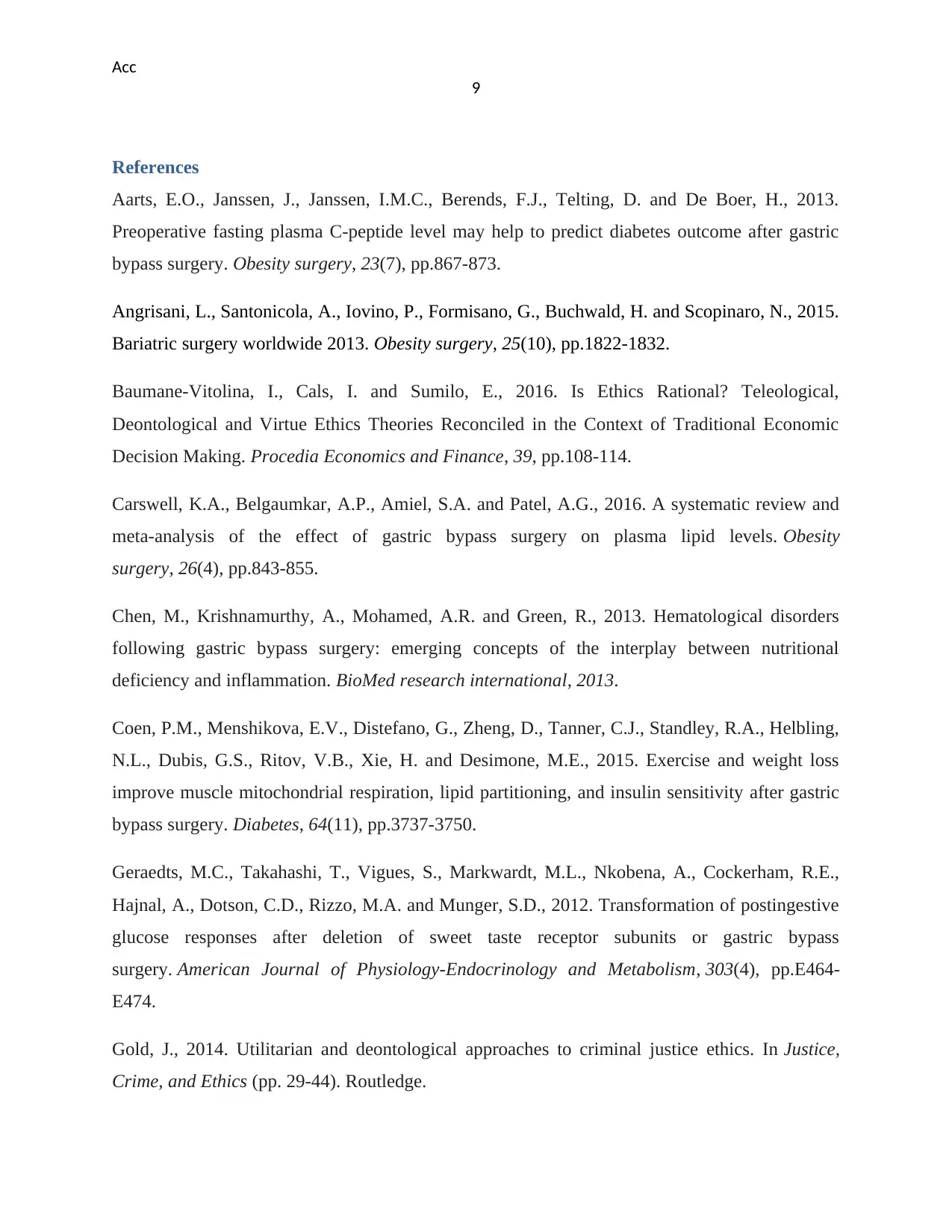
Acc
9
References
Aarts, E.O., Janssen, J., Janssen, I.M.C., Berends, F.J., Telting, D. and De Boer, H., 2013.
Preoperative fasting plasma C-peptide level may help to predict diabetes outcome after gastric
bypass surgery. Obesity surgery, 23(7), pp.867-873.
Angrisani, L., Santonicola, A., Iovino, P., Formisano, G., Buchwald, H. and Scopinaro, N., 2015.
Bariatric surgery worldwide 2013. Obesity surgery, 25(10), pp.1822-1832.
Baumane-Vitolina, I., Cals, I. and Sumilo, E., 2016. Is Ethics Rational? Teleological,
Deontological and Virtue Ethics Theories Reconciled in the Context of Traditional Economic
Decision Making. Procedia Economics and Finance, 39, pp.108-114.
Carswell, K.A., Belgaumkar, A.P., Amiel, S.A. and Patel, A.G., 2016. A systematic review and
meta-analysis of the effect of gastric bypass surgery on plasma lipid levels. Obesity
surgery, 26(4), pp.843-855.
Chen, M., Krishnamurthy, A., Mohamed, A.R. and Green, R., 2013. Hematological disorders
following gastric bypass surgery: emerging concepts of the interplay between nutritional
deficiency and inflammation. BioMed research international, 2013.
Coen, P.M., Menshikova, E.V., Distefano, G., Zheng, D., Tanner, C.J., Standley, R.A., Helbling,
N.L., Dubis, G.S., Ritov, V.B., Xie, H. and Desimone, M.E., 2015. Exercise and weight loss
improve muscle mitochondrial respiration, lipid partitioning, and insulin sensitivity after gastric
bypass surgery. Diabetes, 64(11), pp.3737-3750.
Geraedts, M.C., Takahashi, T., Vigues, S., Markwardt, M.L., Nkobena, A., Cockerham, R.E.,
Hajnal, A., Dotson, C.D., Rizzo, M.A. and Munger, S.D., 2012. Transformation of postingestive
glucose responses after deletion of sweet taste receptor subunits or gastric bypass
surgery. American Journal of Physiology-Endocrinology and Metabolism, 303(4), pp.E464-
E474.
Gold, J., 2014. Utilitarian and deontological approaches to criminal justice ethics. In Justice,
Crime, and Ethics (pp. 29-44). Routledge.
9
References
Aarts, E.O., Janssen, J., Janssen, I.M.C., Berends, F.J., Telting, D. and De Boer, H., 2013.
Preoperative fasting plasma C-peptide level may help to predict diabetes outcome after gastric
bypass surgery. Obesity surgery, 23(7), pp.867-873.
Angrisani, L., Santonicola, A., Iovino, P., Formisano, G., Buchwald, H. and Scopinaro, N., 2015.
Bariatric surgery worldwide 2013. Obesity surgery, 25(10), pp.1822-1832.
Baumane-Vitolina, I., Cals, I. and Sumilo, E., 2016. Is Ethics Rational? Teleological,
Deontological and Virtue Ethics Theories Reconciled in the Context of Traditional Economic
Decision Making. Procedia Economics and Finance, 39, pp.108-114.
Carswell, K.A., Belgaumkar, A.P., Amiel, S.A. and Patel, A.G., 2016. A systematic review and
meta-analysis of the effect of gastric bypass surgery on plasma lipid levels. Obesity
surgery, 26(4), pp.843-855.
Chen, M., Krishnamurthy, A., Mohamed, A.R. and Green, R., 2013. Hematological disorders
following gastric bypass surgery: emerging concepts of the interplay between nutritional
deficiency and inflammation. BioMed research international, 2013.
Coen, P.M., Menshikova, E.V., Distefano, G., Zheng, D., Tanner, C.J., Standley, R.A., Helbling,
N.L., Dubis, G.S., Ritov, V.B., Xie, H. and Desimone, M.E., 2015. Exercise and weight loss
improve muscle mitochondrial respiration, lipid partitioning, and insulin sensitivity after gastric
bypass surgery. Diabetes, 64(11), pp.3737-3750.
Geraedts, M.C., Takahashi, T., Vigues, S., Markwardt, M.L., Nkobena, A., Cockerham, R.E.,
Hajnal, A., Dotson, C.D., Rizzo, M.A. and Munger, S.D., 2012. Transformation of postingestive
glucose responses after deletion of sweet taste receptor subunits or gastric bypass
surgery. American Journal of Physiology-Endocrinology and Metabolism, 303(4), pp.E464-
E474.
Gold, J., 2014. Utilitarian and deontological approaches to criminal justice ethics. In Justice,
Crime, and Ethics (pp. 29-44). Routledge.
Paraphrase This Document
Need a fresh take? Get an instant paraphrase of this document with our AI Paraphraser
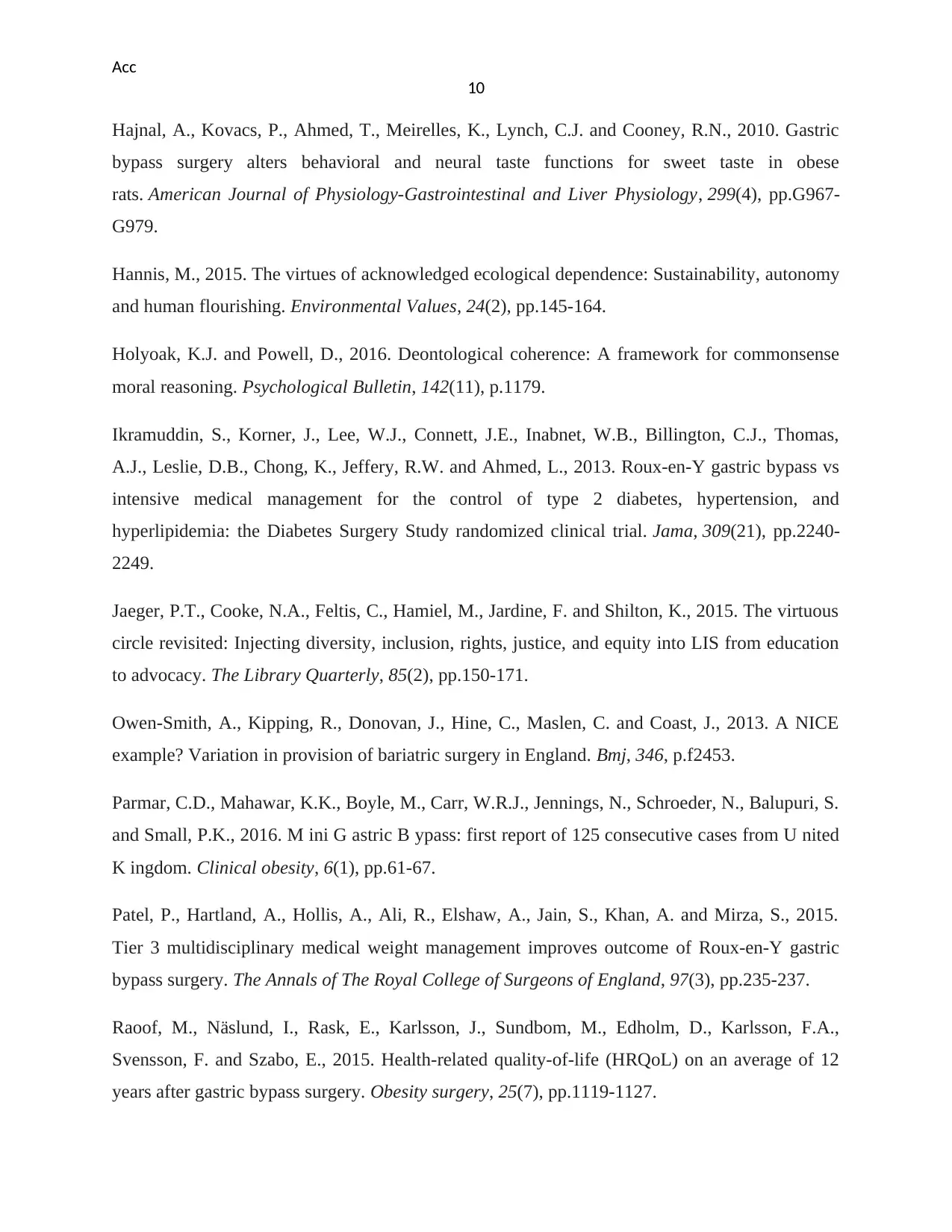
Acc
10
Hajnal, A., Kovacs, P., Ahmed, T., Meirelles, K., Lynch, C.J. and Cooney, R.N., 2010. Gastric
bypass surgery alters behavioral and neural taste functions for sweet taste in obese
rats. American Journal of Physiology-Gastrointestinal and Liver Physiology, 299(4), pp.G967-
G979.
Hannis, M., 2015. The virtues of acknowledged ecological dependence: Sustainability, autonomy
and human flourishing. Environmental Values, 24(2), pp.145-164.
Holyoak, K.J. and Powell, D., 2016. Deontological coherence: A framework for commonsense
moral reasoning. Psychological Bulletin, 142(11), p.1179.
Ikramuddin, S., Korner, J., Lee, W.J., Connett, J.E., Inabnet, W.B., Billington, C.J., Thomas,
A.J., Leslie, D.B., Chong, K., Jeffery, R.W. and Ahmed, L., 2013. Roux-en-Y gastric bypass vs
intensive medical management for the control of type 2 diabetes, hypertension, and
hyperlipidemia: the Diabetes Surgery Study randomized clinical trial. Jama, 309(21), pp.2240-
2249.
Jaeger, P.T., Cooke, N.A., Feltis, C., Hamiel, M., Jardine, F. and Shilton, K., 2015. The virtuous
circle revisited: Injecting diversity, inclusion, rights, justice, and equity into LIS from education
to advocacy. The Library Quarterly, 85(2), pp.150-171.
Owen-Smith, A., Kipping, R., Donovan, J., Hine, C., Maslen, C. and Coast, J., 2013. A NICE
example? Variation in provision of bariatric surgery in England. Bmj, 346, p.f2453.
Parmar, C.D., Mahawar, K.K., Boyle, M., Carr, W.R.J., Jennings, N., Schroeder, N., Balupuri, S.
and Small, P.K., 2016. M ini G astric B ypass: first report of 125 consecutive cases from U nited
K ingdom. Clinical obesity, 6(1), pp.61-67.
Patel, P., Hartland, A., Hollis, A., Ali, R., Elshaw, A., Jain, S., Khan, A. and Mirza, S., 2015.
Tier 3 multidisciplinary medical weight management improves outcome of Roux-en-Y gastric
bypass surgery. The Annals of The Royal College of Surgeons of England, 97(3), pp.235-237.
Raoof, M., Näslund, I., Rask, E., Karlsson, J., Sundbom, M., Edholm, D., Karlsson, F.A.,
Svensson, F. and Szabo, E., 2015. Health-related quality-of-life (HRQoL) on an average of 12
years after gastric bypass surgery. Obesity surgery, 25(7), pp.1119-1127.
10
Hajnal, A., Kovacs, P., Ahmed, T., Meirelles, K., Lynch, C.J. and Cooney, R.N., 2010. Gastric
bypass surgery alters behavioral and neural taste functions for sweet taste in obese
rats. American Journal of Physiology-Gastrointestinal and Liver Physiology, 299(4), pp.G967-
G979.
Hannis, M., 2015. The virtues of acknowledged ecological dependence: Sustainability, autonomy
and human flourishing. Environmental Values, 24(2), pp.145-164.
Holyoak, K.J. and Powell, D., 2016. Deontological coherence: A framework for commonsense
moral reasoning. Psychological Bulletin, 142(11), p.1179.
Ikramuddin, S., Korner, J., Lee, W.J., Connett, J.E., Inabnet, W.B., Billington, C.J., Thomas,
A.J., Leslie, D.B., Chong, K., Jeffery, R.W. and Ahmed, L., 2013. Roux-en-Y gastric bypass vs
intensive medical management for the control of type 2 diabetes, hypertension, and
hyperlipidemia: the Diabetes Surgery Study randomized clinical trial. Jama, 309(21), pp.2240-
2249.
Jaeger, P.T., Cooke, N.A., Feltis, C., Hamiel, M., Jardine, F. and Shilton, K., 2015. The virtuous
circle revisited: Injecting diversity, inclusion, rights, justice, and equity into LIS from education
to advocacy. The Library Quarterly, 85(2), pp.150-171.
Owen-Smith, A., Kipping, R., Donovan, J., Hine, C., Maslen, C. and Coast, J., 2013. A NICE
example? Variation in provision of bariatric surgery in England. Bmj, 346, p.f2453.
Parmar, C.D., Mahawar, K.K., Boyle, M., Carr, W.R.J., Jennings, N., Schroeder, N., Balupuri, S.
and Small, P.K., 2016. M ini G astric B ypass: first report of 125 consecutive cases from U nited
K ingdom. Clinical obesity, 6(1), pp.61-67.
Patel, P., Hartland, A., Hollis, A., Ali, R., Elshaw, A., Jain, S., Khan, A. and Mirza, S., 2015.
Tier 3 multidisciplinary medical weight management improves outcome of Roux-en-Y gastric
bypass surgery. The Annals of The Royal College of Surgeons of England, 97(3), pp.235-237.
Raoof, M., Näslund, I., Rask, E., Karlsson, J., Sundbom, M., Edholm, D., Karlsson, F.A.,
Svensson, F. and Szabo, E., 2015. Health-related quality-of-life (HRQoL) on an average of 12
years after gastric bypass surgery. Obesity surgery, 25(7), pp.1119-1127.
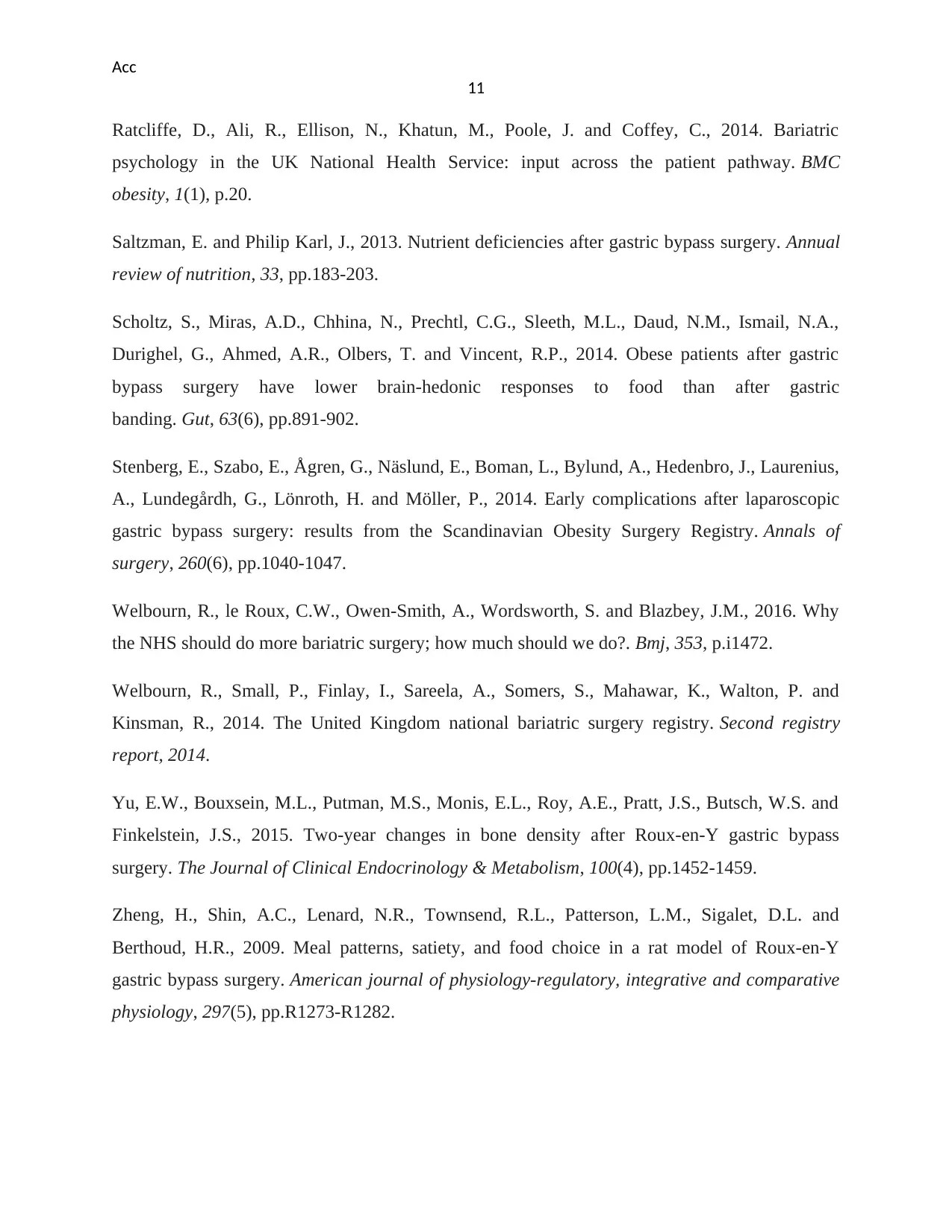
Acc
11
Ratcliffe, D., Ali, R., Ellison, N., Khatun, M., Poole, J. and Coffey, C., 2014. Bariatric
psychology in the UK National Health Service: input across the patient pathway. BMC
obesity, 1(1), p.20.
Saltzman, E. and Philip Karl, J., 2013. Nutrient deficiencies after gastric bypass surgery. Annual
review of nutrition, 33, pp.183-203.
Scholtz, S., Miras, A.D., Chhina, N., Prechtl, C.G., Sleeth, M.L., Daud, N.M., Ismail, N.A.,
Durighel, G., Ahmed, A.R., Olbers, T. and Vincent, R.P., 2014. Obese patients after gastric
bypass surgery have lower brain-hedonic responses to food than after gastric
banding. Gut, 63(6), pp.891-902.
Stenberg, E., Szabo, E., Ågren, G., Näslund, E., Boman, L., Bylund, A., Hedenbro, J., Laurenius,
A., Lundegårdh, G., Lönroth, H. and Möller, P., 2014. Early complications after laparoscopic
gastric bypass surgery: results from the Scandinavian Obesity Surgery Registry. Annals of
surgery, 260(6), pp.1040-1047.
Welbourn, R., le Roux, C.W., Owen-Smith, A., Wordsworth, S. and Blazbey, J.M., 2016. Why
the NHS should do more bariatric surgery; how much should we do?. Bmj, 353, p.i1472.
Welbourn, R., Small, P., Finlay, I., Sareela, A., Somers, S., Mahawar, K., Walton, P. and
Kinsman, R., 2014. The United Kingdom national bariatric surgery registry. Second registry
report, 2014.
Yu, E.W., Bouxsein, M.L., Putman, M.S., Monis, E.L., Roy, A.E., Pratt, J.S., Butsch, W.S. and
Finkelstein, J.S., 2015. Two-year changes in bone density after Roux-en-Y gastric bypass
surgery. The Journal of Clinical Endocrinology & Metabolism, 100(4), pp.1452-1459.
Zheng, H., Shin, A.C., Lenard, N.R., Townsend, R.L., Patterson, L.M., Sigalet, D.L. and
Berthoud, H.R., 2009. Meal patterns, satiety, and food choice in a rat model of Roux-en-Y
gastric bypass surgery. American journal of physiology-regulatory, integrative and comparative
physiology, 297(5), pp.R1273-R1282.
11
Ratcliffe, D., Ali, R., Ellison, N., Khatun, M., Poole, J. and Coffey, C., 2014. Bariatric
psychology in the UK National Health Service: input across the patient pathway. BMC
obesity, 1(1), p.20.
Saltzman, E. and Philip Karl, J., 2013. Nutrient deficiencies after gastric bypass surgery. Annual
review of nutrition, 33, pp.183-203.
Scholtz, S., Miras, A.D., Chhina, N., Prechtl, C.G., Sleeth, M.L., Daud, N.M., Ismail, N.A.,
Durighel, G., Ahmed, A.R., Olbers, T. and Vincent, R.P., 2014. Obese patients after gastric
bypass surgery have lower brain-hedonic responses to food than after gastric
banding. Gut, 63(6), pp.891-902.
Stenberg, E., Szabo, E., Ågren, G., Näslund, E., Boman, L., Bylund, A., Hedenbro, J., Laurenius,
A., Lundegårdh, G., Lönroth, H. and Möller, P., 2014. Early complications after laparoscopic
gastric bypass surgery: results from the Scandinavian Obesity Surgery Registry. Annals of
surgery, 260(6), pp.1040-1047.
Welbourn, R., le Roux, C.W., Owen-Smith, A., Wordsworth, S. and Blazbey, J.M., 2016. Why
the NHS should do more bariatric surgery; how much should we do?. Bmj, 353, p.i1472.
Welbourn, R., Small, P., Finlay, I., Sareela, A., Somers, S., Mahawar, K., Walton, P. and
Kinsman, R., 2014. The United Kingdom national bariatric surgery registry. Second registry
report, 2014.
Yu, E.W., Bouxsein, M.L., Putman, M.S., Monis, E.L., Roy, A.E., Pratt, J.S., Butsch, W.S. and
Finkelstein, J.S., 2015. Two-year changes in bone density after Roux-en-Y gastric bypass
surgery. The Journal of Clinical Endocrinology & Metabolism, 100(4), pp.1452-1459.
Zheng, H., Shin, A.C., Lenard, N.R., Townsend, R.L., Patterson, L.M., Sigalet, D.L. and
Berthoud, H.R., 2009. Meal patterns, satiety, and food choice in a rat model of Roux-en-Y
gastric bypass surgery. American journal of physiology-regulatory, integrative and comparative
physiology, 297(5), pp.R1273-R1282.
⊘ This is a preview!⊘
Do you want full access?
Subscribe today to unlock all pages.

Trusted by 1+ million students worldwide
1 out of 12
Related Documents
Your All-in-One AI-Powered Toolkit for Academic Success.
+13062052269
info@desklib.com
Available 24*7 on WhatsApp / Email
![[object Object]](/_next/static/media/star-bottom.7253800d.svg)
Unlock your academic potential
Copyright © 2020–2026 A2Z Services. All Rights Reserved. Developed and managed by ZUCOL.





